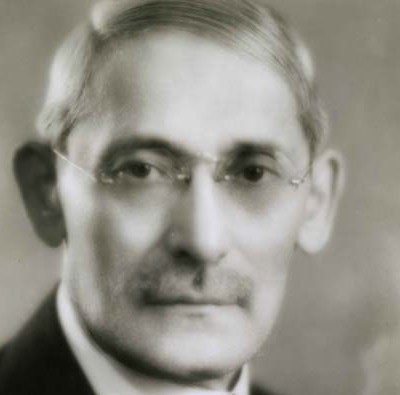
Avraham Yitzchak “Adolph” Edlis (1860-1934) immigrated to New York City from Hungary about 1870. He peddled knives, razors, styptic pencils and other notions until 1883, when he became a travelling salesman for barber supply companies. In 1888, he relocated to Pittsburgh, one of the stops in his sales territory, to begin his own company.
He started the business in a house at Wylie and Fernando in the Hill District before moving to Liberty Avenue, Grant Street and Smithfield Street. In 1927, he commissioned architect Richard Neff to design the eight-story Edlis Building at 329 Boulevard of the Allies. Today, Edlis Inc. is located at 2033 Smallman Street in the Strip District.
The Edlis Company manufactured and distributed perfumes, shampoos, hair dyes, dandruff preparations and other necessities for barbers, beauty salons and government institutions such as prisons and hospitals. Edlis held numerous patents and trademarks for a wide range of products. In later years, the company designed and built interiors for beauty shops. The company sold its products throughout a broad area extending into central Pennsylvania, western Maryland, West Virginia and parts of Ohio. Edlis eventually opened branch offices in Columbus, Ohio, and Charleston, West Virginia.
Adolph Edlis was active in the local Republican Party at the turn of the century. Tapping into the growing Jewish population of the Hill District, he was elected in 1897 to represent the Seventh Ward on the Pittsburgh Common Council, the predecessor of City Council. In 1905 and 1906, he served in the state legislature. During his tenure, he sponsored the Edlis Act, which outlawed houses of prostitution in Pittsburgh. He also opposed the so-called Blue Laws, which prohibited commercial activity on Sunday and harmed Jewish businesses that already closed on Saturday, for the Jewish Sabbath.
After his term in the state legislature, Edlis was appointed by Mayor-elect William Magee to serve as city treasurer, a post he held from 1909 to 1914. Among his reforms, he dissolved the redundant and costly Delinquent Tax Office, which was entwined in corrupt party politics. The move led the Republican Party to withdraw its support for Edlis, according to the research of historian Ida Cohen Selavan. Toward the end of his political career, Edlis became an Independent. In his last political endeavor, he organized the local Independent Republican campaign for Franklin D. Roosevelt in 1932.
Edlis focused on community efforts in his later years. He helped found Congregation Adath Jeshurun on Margaretta Street in East Liberty and helped Congregation Poale Zedeck move from the Hill District to its current home on Shady Avenue in Squirrel Hill.
In 1882, Adolph Edlis married Amelia Lehman. They had eight children. When Edlis died in 1934, he left the business to his youngest son, Jerome Edlis (1898-1986).
Like his father, Jerome Edlis maintained a presence in the local Republican Party, running unsuccessfully for City Council in 1939 and 1940 and for City Controller. “My attitude in Council will be no different than in business — a ‘middle of the road’ attitude insofar as business and labor are concerned. Both must give and take,” he told the Jewish Criterion in 1939 during a run for City Council. “My idea is to be not too liberal or too conservative.”